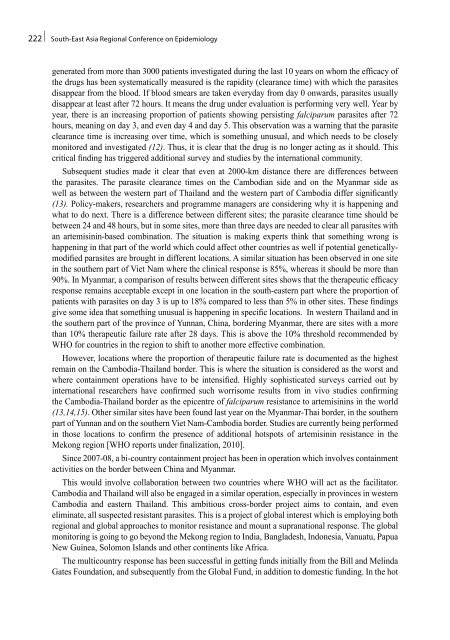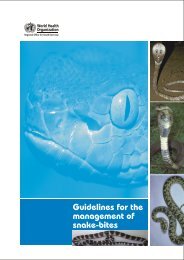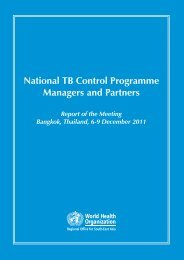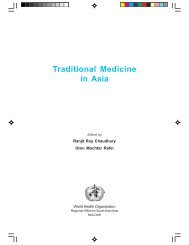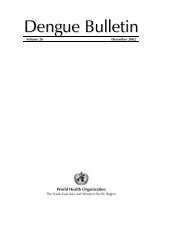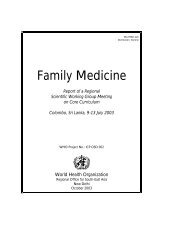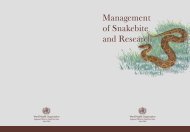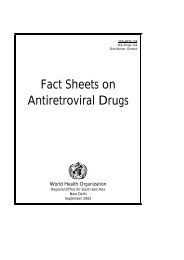South-East Asia Regional Conference on Epidemiology
South-East Asia Regional Conference on Epidemiology
South-East Asia Regional Conference on Epidemiology
Create successful ePaper yourself
Turn your PDF publications into a flip-book with our unique Google optimized e-Paper software.
222 | <str<strong>on</strong>g>South</str<strong>on</strong>g>-<str<strong>on</strong>g>East</str<strong>on</strong>g> <str<strong>on</strong>g>Asia</str<strong>on</strong>g> <str<strong>on</strong>g>Regi<strong>on</strong>al</str<strong>on</strong>g> <str<strong>on</strong>g>C<strong>on</strong>ference</str<strong>on</strong>g> <strong>on</strong> <strong>Epidemiology</strong><br />
generated from more than 3000 patients investigated during the last 10 years <strong>on</strong> whom the efficacy of<br />
the drugs has been systematically measured is the rapidity (clearance time) with which the parasites<br />
disappear from the blood. If blood smears are taken everyday from day 0 <strong>on</strong>wards, parasites usually<br />
disappear at least after 72 hours. It means the drug under evaluati<strong>on</strong> is performing very well. Year by<br />
year, there is an increasing proporti<strong>on</strong> of patients showing persisting falciparum parasites after 72<br />
hours, meaning <strong>on</strong> day 3, and even day 4 and day 5. This observati<strong>on</strong> was a warning that the parasite<br />
clearance time is increasing over time, which is something unusual, and which needs to be closely<br />
m<strong>on</strong>itored and investigated (12). Thus, it is clear that the drug is no l<strong>on</strong>ger acting as it should. This<br />
critical finding has triggered additi<strong>on</strong>al survey and studies by the internati<strong>on</strong>al community.<br />
Subsequent studies made it clear that even at 2000-km distance there are differences between<br />
the parasites. The parasite clearance times <strong>on</strong> the Cambodian side and <strong>on</strong> the Myanmar side as<br />
well as between the western part of Thailand and the western part of Cambodia differ significantly<br />
(13). Policy-makers, researchers and programme managers are c<strong>on</strong>sidering why it is happening and<br />
what to do next. There is a difference between different sites; the parasite clearance time should be<br />
between 24 and 48 hours, but in some sites, more than three days are needed to clear all parasites with<br />
an artemisinin-based combinati<strong>on</strong>. The situati<strong>on</strong> is making experts think that something wr<strong>on</strong>g is<br />
happening in that part of the world which could affect other countries as well if potential geneticallymodified<br />
parasites are brought in different locati<strong>on</strong>s. A similar situati<strong>on</strong> has been observed in <strong>on</strong>e site<br />
in the southern part of Viet Nam where the clinical resp<strong>on</strong>se is 85%, whereas it should be more than<br />
90%. In Myanmar, a comparis<strong>on</strong> of results between different sites shows that the therapeutic efficacy<br />
resp<strong>on</strong>se remains acceptable except in <strong>on</strong>e locati<strong>on</strong> in the south-eastern part where the proporti<strong>on</strong> of<br />
patients with parasites <strong>on</strong> day 3 is up to 18% compared to less than 5% in other sites. These findings<br />
give some idea that something unusual is happening in specific locati<strong>on</strong>s. In western Thailand and in<br />
the southern part of the province of Yunnan, China, bordering Myanmar, there are sites with a more<br />
than 10% therapeutic failure rate after 28 days. This is above the 10% threshold recommended by<br />
WHO for countries in the regi<strong>on</strong> to shift to another more effective combinati<strong>on</strong>.<br />
However, locati<strong>on</strong>s where the proporti<strong>on</strong> of therapeutic failure rate is documented as the highest<br />
remain <strong>on</strong> the Cambodia-Thailand border. This is where the situati<strong>on</strong> is c<strong>on</strong>sidered as the worst and<br />
where c<strong>on</strong>tainment operati<strong>on</strong>s have to be intensified. Highly sophisticated surveys carried out by<br />
internati<strong>on</strong>al researchers have c<strong>on</strong>firmed such worrisome results from in vivo studies c<strong>on</strong>firming<br />
the Cambodia-Thailand border as the epicentre of falciparum resistance to artemisinins in the world<br />
(13,14,15). Other similar sites have been found last year <strong>on</strong> the Myanmar-Thai border, in the southern<br />
part of Yunnan and <strong>on</strong> the southern Viet Nam-Cambodia border. Studies are currently being performed<br />
in those locati<strong>on</strong>s to c<strong>on</strong>firm the presence of additi<strong>on</strong>al hotspots of artemisinin resistance in the<br />
Mek<strong>on</strong>g regi<strong>on</strong> [WHO reports under finalizati<strong>on</strong>, 2010].<br />
Since 2007-08, a bi-country c<strong>on</strong>tainment project has been in operati<strong>on</strong> which involves c<strong>on</strong>tainment<br />
activities <strong>on</strong> the border between China and Myanmar.<br />
This would involve collaborati<strong>on</strong> between two countries where WHO will act as the facilitator.<br />
Cambodia and Thailand will also be engaged in a similar operati<strong>on</strong>, especially in provinces in western<br />
Cambodia and eastern Thailand. This ambitious cross-border project aims to c<strong>on</strong>tain, and even<br />
eliminate, all suspected resistant parasites. This is a project of global interest which is employing both<br />
regi<strong>on</strong>al and global approaches to m<strong>on</strong>itor resistance and mount a supranati<strong>on</strong>al resp<strong>on</strong>se. The global<br />
m<strong>on</strong>itoring is going to go bey<strong>on</strong>d the Mek<strong>on</strong>g regi<strong>on</strong> to India, Bangladesh, Ind<strong>on</strong>esia, Vanuatu, Papua<br />
New Guinea, Solom<strong>on</strong> Islands and other c<strong>on</strong>tinents like Africa.<br />
The multicountry resp<strong>on</strong>se has been successful in getting funds initially from the Bill and Melinda<br />
Gates Foundati<strong>on</strong>, and subsequently from the Global Fund, in additi<strong>on</strong> to domestic funding. In the hot


